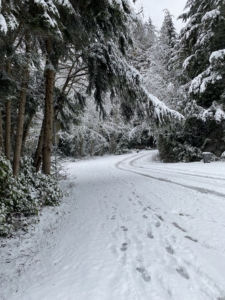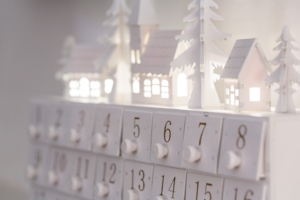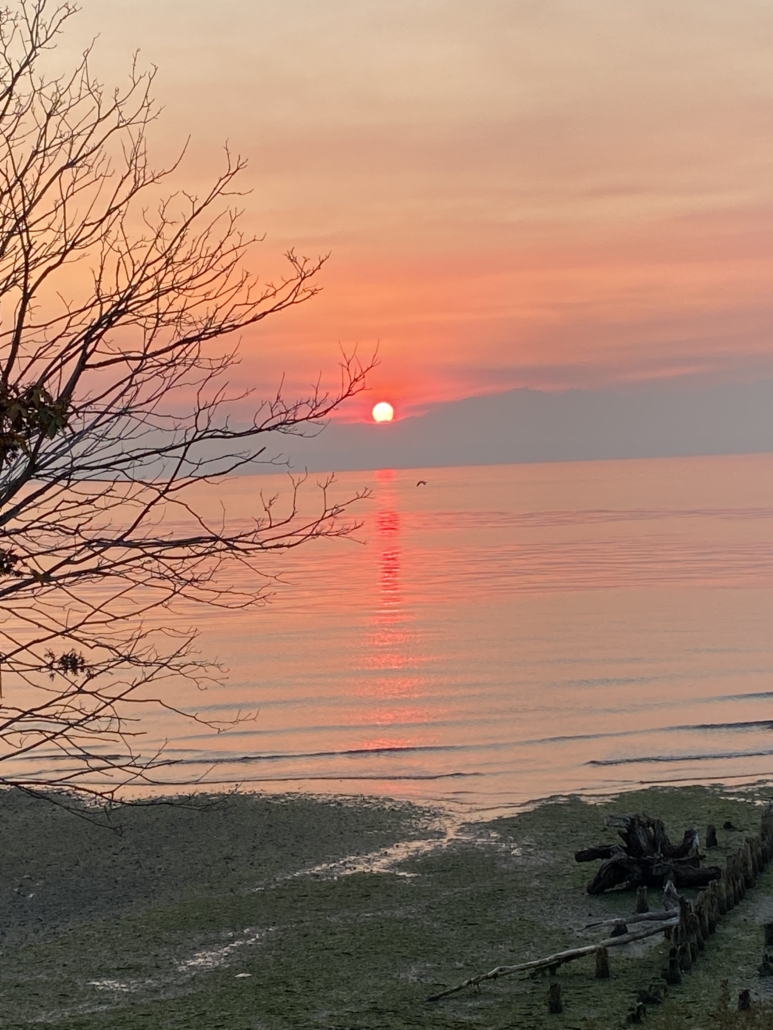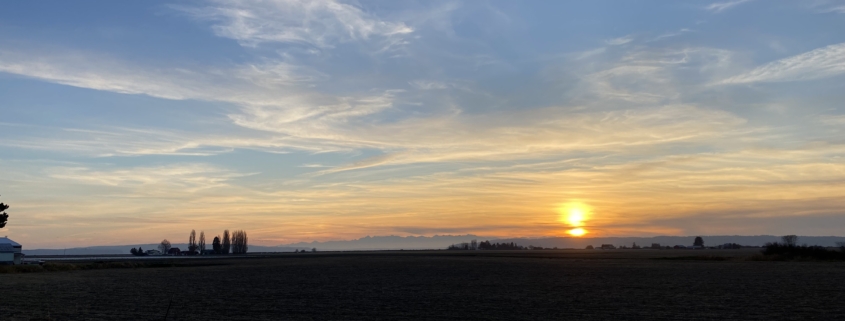Winter Solstice Greetings
Here in my neighborhood north of Seattle, Washington, we have had our second snowfall of the year—about three inches yesterday and the evening before. Today, it’s 27 degrees (low of 19!) and the sun is shining. Outside my window: glittering white.
On December 1st, despite slush and ice, I set out for a long afternoon walk, and I slipped on a patch of ice, fell hard, and  cracked the head of my left radius bone, right up there in my elbow. I was in a fiberglass splint—looked like and felt like a big ol’ cast—for 7 days. The initial evaluation suggested the crack went all the way through. I couldn’t use my arm, I couldn’t get it wet, couldn’t practice my Christmas songs on the piano, couldn’t wear my Christmas sweaters. I couldn’t type! It took me four or five days just to figure out how to wear clothes and leave the house.
cracked the head of my left radius bone, right up there in my elbow. I was in a fiberglass splint—looked like and felt like a big ol’ cast—for 7 days. The initial evaluation suggested the crack went all the way through. I couldn’t use my arm, I couldn’t get it wet, couldn’t practice my Christmas songs on the piano, couldn’t wear my Christmas sweaters. I couldn’t type! It took me four or five days just to figure out how to wear clothes and leave the house.
I saw the orthopedic surgeon on day seven, expecting to be told I’d need surgery. Instead, he said the crack was partial, and “No surgery,” plus—amazing grace—no cast! In his opinion the crack would heal just fine if I didn’t lift, push, or pull with my left arm, or fall down again. He showed me how a single week of having the arm in the splint had weakened my grip, and compromised my ability to move my wrist or do simple things like touch my head. (Try flossing your teeth when you have only one arm.) “That’s not from the break; that’s from having your arm immobilized. If you wear a cast for six or eight weeks, you’ll need physical therapy for a year!”
He said I could do “light kitchen work” and—more important—“you can type.”
I admit to having entirely lost my Christmas spirit. I’m only now getting it back. Partially.
Nonetheless, over the last few weeks I have been co-leader of an Advent study at my church. I committed to it in October, after all, and my primary role in the group is merely to bring poems. Easy peasy. I’ve collected both traditional Advent poems by well-known Christian writers such as Madeleine L’Engle and Oscar Romero, and poems that might not spring to mind when we’re talking about Bethlehem, gentle donkeys, shepherds guarding their flocks by night, and the birth of a savior in a stable.
Not that such poems can’t be wonderful. (Of course they are.) I guess what I’ve been after is to broaden our context, to make us see the Advent season in the light of our own lives.
Advent first began in the 4th century as a period of penance for new converts. It didn’t lead to December 25, like an Advent calendar with little chocolates inside, but to Epiphany (January 6). Advent comes from the Latin, adventus, meaning “arrival” or “coming,” and from the Greek, parousia, which is also translated as “presence,” especially, “presence after  absence” (or second coming). Back then, Advent was sometimes referred to as “the Lent of St. Martin’s” (and began on St. Martin’s day, November 11). Also, it was considered heretical to associate the Christian season too heavily with the winter solstice—too pagan. Sorry, but for me that’s exactly what’s evoked, and why I was drawn toward wanting to take part in the class. Well, light and an adventure.
absence” (or second coming). Back then, Advent was sometimes referred to as “the Lent of St. Martin’s” (and began on St. Martin’s day, November 11). Also, it was considered heretical to associate the Christian season too heavily with the winter solstice—too pagan. Sorry, but for me that’s exactly what’s evoked, and why I was drawn toward wanting to take part in the class. Well, light and an adventure.
I’ve made some surprising discoveries. In the book my co-leader assigned, Jill Duffield’s Advent in Plain Sight: A Devotion through Ten Objects, the first object is “gates.” I love that—I did a little digging and learned that the word “gate” appears 418 times in the King James Bible. In my introduction to the poems, I talked about how a gate can seem to be a barrier, but it’s really an invitation. A gate marks a path to be followed.
Poems, too, are gates. In my college teaching career I often encountered students who hated poetry. They saw a poem as a gate with a “no trespassing” sign hanging on it. But isn’t a poem, like a gate, an invitation? Open this. Walk through. See the world the way I see it. The first poem I brought was Naomi Shihab Nye’s “Kindness,” and the study group climbed onto the bus with me. “There’s communion here,” one participant gleefully noted. And another: “it’s a story of the good Samaritan!”
I found this short poem by Richard Bauckham on an Advent website, The Adventus Project. Details such as keeping vigil, a turn of the tide, and the cattle-shed roof lend it an Advent gloss, yet it’s multi-valent. A Druidic heart could be happy here. Bauckham is a theologian and poet who lives in Great Britain, but he could be my neighbor here in the Pacific Northwest in my house in the woods.
First Light
After all the false dawns,
who is this who unerringly paints
the first rays in their true colours?
We have kept vigil with owls
when the occult noises of the night
fell tauntingly silent
and a breeze got up
as if for morning.
This time the trees tremble.
Is it with a kind of reckless joy
at the gentle light
lapping their leaves
like the very first turn of a tide?
Timid creatures creep out of burrows
sensing kindness
and the old crow on the cattle-shed roof
folds his wings and dreams.Richard Bauckham
My apologies for a somewhat wobbly, all-over-the place post. (Consider that I was told I wouldn’t be able to type for 6 weeks!)
Sunday evening at 11:00 my dog desperately needed a walk, so, despite the falling snow, we went out (with every caution for secure footing), and one reward was an owl hooting continuously from the snowy woods. No wonder my dog was restless. No wonder I love Bauckham’s poem: “We have kept vigil with owls.” Me, too.
It’s a gorgeous time of year, when you’re not all broken and needing a nap and a cookie (did you know that when you have a broken bone your body burns 20-30% more calories? Someone told me so—maybe just indulging my natural inclination).
When I first began gathering poems for the Advent class, I had a notion that the study participants would want to write with me. That didn’t happen (with the addition of a co-leader and the book, it became more conventional, which is fine), but it hasn’t kept me from writing. Early on, I came across a poem by Laura Walker titled “Psalm 100” (follow the link to read it for yourself). It made me open my Bible and reread Psalm 100. And then I wrote my own poem. Is it an Advent poem? Not really, unless you see it—like Bauckham’s poem—in a tradition of praise.
So, for solstice, here’s my poem in praise of light. From here on out, each day enjoy those extra few seconds of daylight.
Morning at Glen Cove
Make a joyful noise to the Lord, all the earth!
–Psalm 100, NIVAfter a night of wind the cove sings.
Under cold water, a skein of herring,above, a skein of glaucous-
winged gulls. Scraw of bald eagleand great blue heron, sky
brimming, unfurled. In the early morning half-darksea lions bark, hoarse with so much praise.
Sunrise offers a kingfisherchittering down the pink light.
Bethany Reid / 2022





What a gift of a post! Thank you! I am sorry about your fall and injury. A year of PT would be so onerous! I am glad you’ve been spared. Best wishes to you in the coming year. Hope to continue seeing you here.
and you too!
wow
Sorry for your fall, glad of your healing and typing! Happy Winter Holidays to you!
Such a good poem and good thoughts. Thank you.
Gorgeous poem. Happy New Year!
Loved the comments — all encouragement welcome!
I too am typing with one hand now….joined your club Bethany! I tripped on an odd curb at a carpark on Friday night and broke my left wrist. Now I am wearing a huge cast that will be removed and replaced when I have surgery. 2-3 months of healing, so you can tell me about your PT process, Bethany. Here’s my “poem” about it:
I Broke My Wrist
When you ask God for things
be very specific –
I said
I needed a break.
p.s. I loved your early morning poem!
Oh no! We will compare notes soon. Keep me posted!